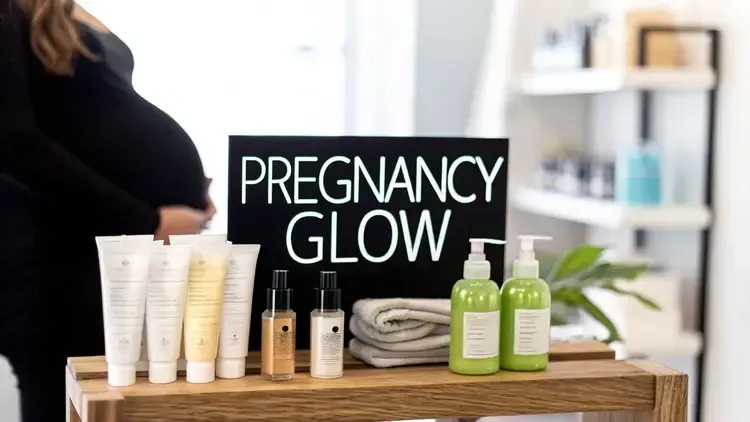
Your Guide to a Safe Pregnancy Skincare Routine
A good pregnancy skincare routine is all about simplicity and safety. It means swapping out certain active ingredients—like retinoids and high-dose salicylic acid—for gentler, more hydrating alternatives. The focus shifts to protecting your newly sensitive skin, calming hormonal flare-ups, and keeping everything healthy and balanced for both you and your baby.
How Pregnancy Changes Your Skin
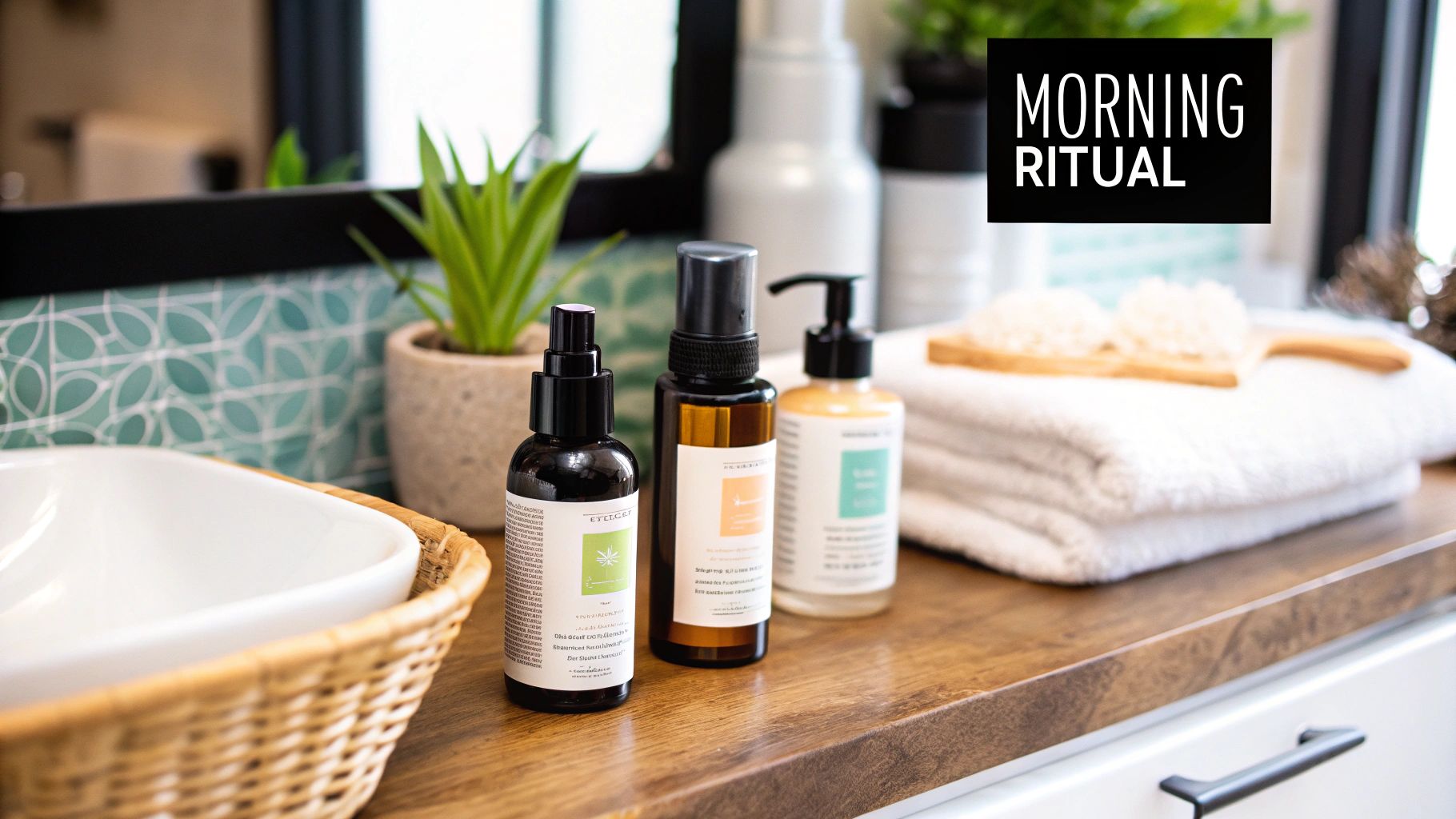
Pregnancy is an incredible journey of transformation, and your skin is definitely along for the ride. While everyone talks about the coveted "pregnancy glow," which comes from increased blood flow, the reality is often a lot more complicated. Hormones are the main culprit behind all the unexpected shifts you might be seeing.
You're not imagining it. These changes are very real and can show up in a few common ways:
Acne and Oiliness: If your skin suddenly feels like it's back in high school, you can thank a surge in hormones called androgens. They kick your oil glands into high gear, which can lead to clogged pores and breakouts, even if you’ve had clear skin for years.
Melasma (The "Mask of Pregnancy"): Have you noticed dark, blotchy patches on your cheeks, forehead, or upper lip? That’s melasma. It’s a form of hyperpigmentation triggered by the hormonal shifts that stimulate melanin production.
Sudden Sensitivities: That trusty moisturizer you’ve sworn by for a decade might suddenly cause redness or irritation. It's common for skin to become much more reactive during pregnancy.
Working With Your Skin, Not Against It
Once you understand why your skin is acting out, you can start building a routine that supports it. This isn't about fighting your skin but rather nurturing it through all the changes. This new way of thinking has created a huge demand for safe, effective products designed specifically for this time.
The global market for pregnancy care products really puts this into perspective. Valued at roughly USD 9.3 billion in 2025, it’s expected to climb to USD 15.2 billion by 2035.
This boom shows a massive shift towards ingredients that are gentle enough for pregnancy but still get the job done. Building a dedicated skincare routine now is more than just tackling skin issues; it's a small but powerful act of self-care. It’s about feeling good in your own skin during one of life's biggest changes. You can read more about the trends in pregnancy care products on futuremarketinsights.com.
Building Your Morning Protection Routine
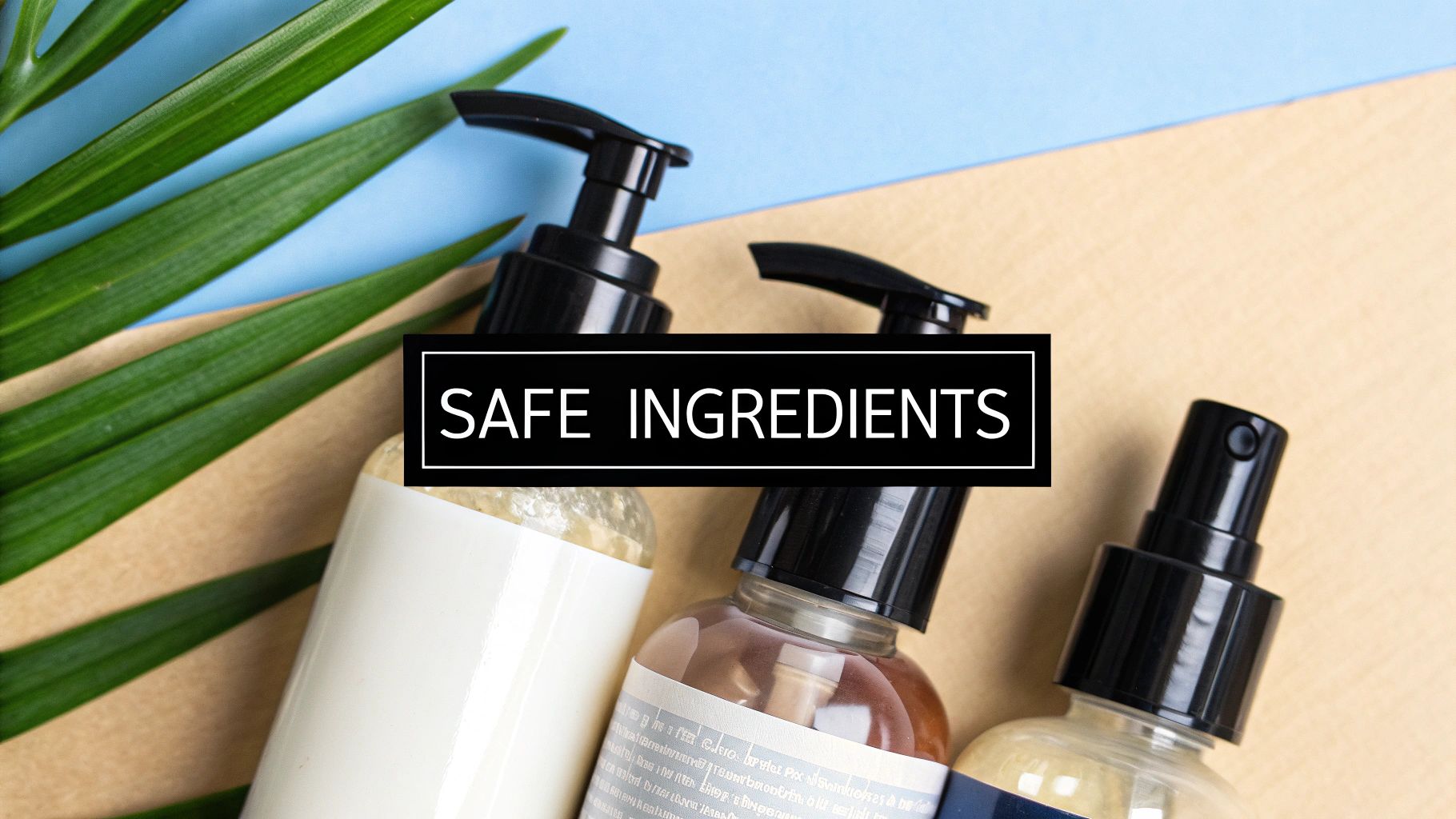
Let’s be honest, your morning pregnancy skincare routine shouldn't be a 12-step ordeal. You’ve got enough going on! The real focus is simple: a gentle cleanse, a bit of antioxidant defense, and solid sun protection. This quick, effective approach gets you ready for the day without any fuss.
First up, cleanser. I always recommend starting with something incredibly mild and hydrating. Think creamy, milky cleansers that wash away impurities without stripping your skin’s natural moisture barrier. Pregnancy often brings on new sensitivities, so it's smart to steer clear of harsh scrubs or sudsy, sulfate-heavy formulas. The goal is to feel fresh and soft, never tight or squeaky clean.
Once your face is cleansed and patted dry, it’s time for an antioxidant serum. A pregnancy-safe Vitamin C serum is a true workhorse here. It helps fend off daily environmental stressors like pollution and UV exposure. Plus, it’s fantastic for tackling pigmentation issues, giving you a gentle way to manage any melasma or dark spots that pop up.
Lock in Hydration and Shield Your Skin
After letting your serum sink in for a minute, you'll want to lock it all in with a good moisturizer. I know what you’re thinking—“But my skin is suddenly so oily!”—but don’t skip this. A quality moisturizer reinforces your skin's protective barrier and seals in the good stuff from your serum. Look for lightweight formulas with ingredients like hyaluronic acid or ceramides to get the job done without feeling heavy.
Now for the final, and most crucial, step: sunscreen. Sun protection is always a top priority, but it’s absolutely non-negotiable during pregnancy when your skin is much more prone to hyperpigmentation.
The gold standard for expecting moms is a mineral-based, broad-spectrum sunscreen with an SPF of 30 or higher. These are physical sunscreens that create a barrier on top of the skin, making them a wonderfully gentle and effective choice.
When you're scanning the ingredients list, keep an eye out for these two powerhouses:
Zinc Oxide: This is your best friend for broad-spectrum protection against both UVA and UVB rays.
Titanium Dioxide: Often works alongside zinc oxide for complete, gentle coverage.
Making a generous application of sunscreen part of your daily morning ritual—even on cloudy days—is the single best thing you can do to keep your skin healthy and even-toned throughout your pregnancy.
Your Nightly Repair and Restore Ritual
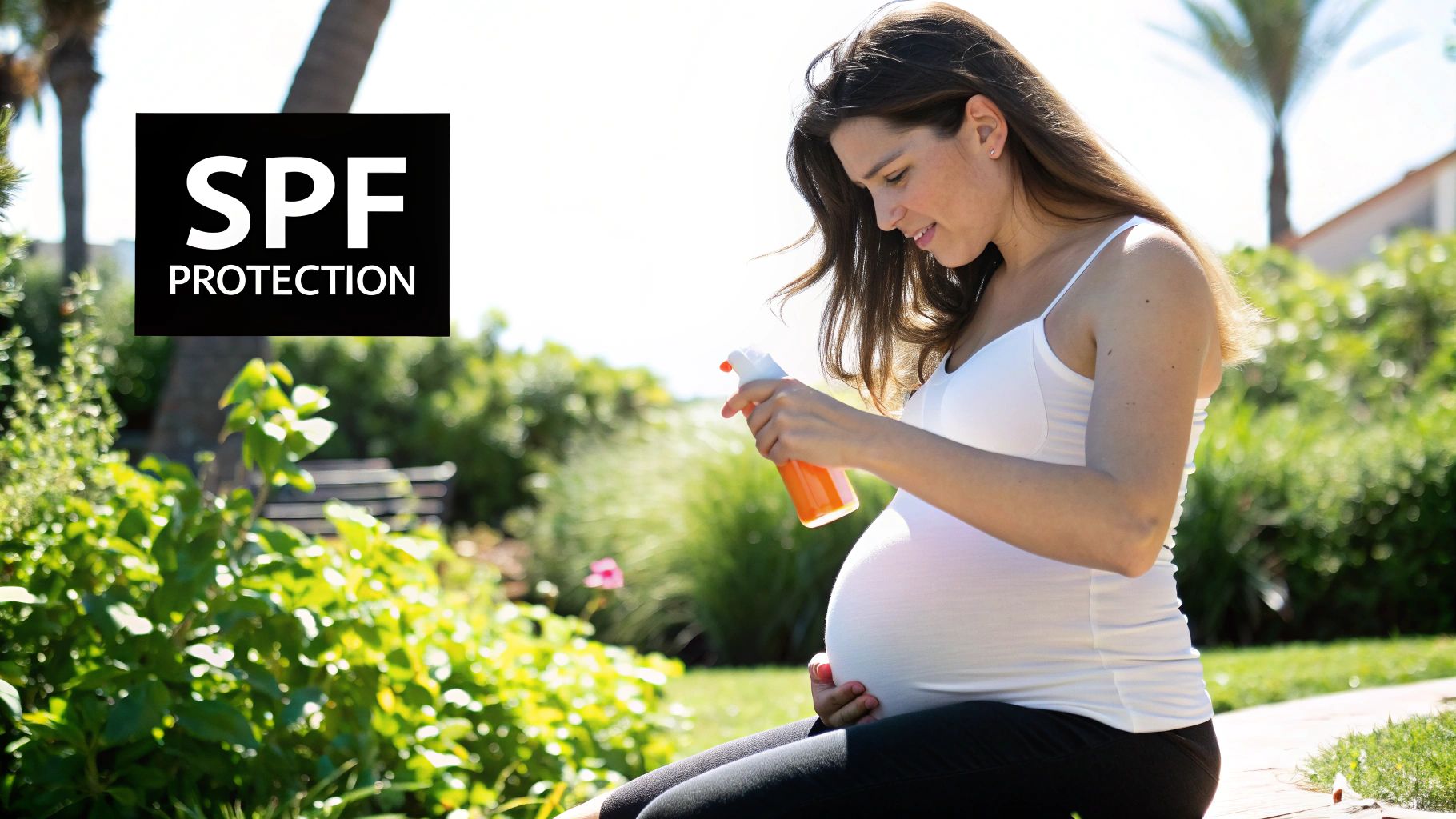
While you sleep, your skin is hard at work repairing itself. A dedicated evening pregnancy skincare routine is all about supporting that natural regeneration process, helping your complexion recover from everything the day threw at it. I always tell my clients to think of this as a quiet moment of self-care to wind down, not just another chore before bed.
The absolute best way to start is with a double cleanse. This two-step method is a game-changer, especially if you’ve been wearing makeup or mineral sunscreen all day.
First, go in with an oil-based cleanser or a rich cleansing balm. Gently massage it onto dry skin to literally melt away every trace of sunscreen, makeup, and built-up oil. Once you rinse, you’ll be amazed at what comes off.
Next, follow up with your gentle, water-based cleanser. This step clears away any leftover residue and preps your skin, leaving you with a perfectly clean slate that's ready to drink up the good stuff you’re about to apply.
Layering Serums for Overnight Restoration
Now that your skin is freshly cleansed, it’s time for targeted treatments. The trick is to layer your serums from the thinnest to the thickest consistency, giving each one a minute or so to sink in before moving on to the next.
Here are a couple of my favorite go-to ingredients that are completely safe and effective during pregnancy:
Hyaluronic Acid: This is a hydration powerhouse. It pulls moisture deep into the skin, which helps to plump up fine lines and give you that dewy, well-rested glow by morning.
Niacinamide (Vitamin B3): An absolute hero for calming things down. If you're dealing with hormonal breakouts or redness, niacinamide is fantastic for soothing inflammation and strengthening your skin's protective barrier.
The final, crucial step is to lock it all in. Seal everything with a nourishing moisturizer or a facial oil. A good night cream acts like a protective blanket, preventing moisture from evaporating overnight and ensuring those powerful serum ingredients can work their magic.
Your evening routine isn't just about washing your face; it’s a restorative practice that nourishes your skin on a deeper level. This small nightly ritual is a true investment in a healthier, more resilient complexion.
Your Guide to Pregnancy-Safe Skincare Ingredients
Staring at a long, complicated ingredient list can feel completely overwhelming, especially when you’re pregnant. I get it. The good news is, you don't need a chemistry degree to figure it out. Let's walk through the key ingredients you can embrace and the ones you should set aside for now.
The Good Guys: Your Skin's Best Friends
These ingredients are your go-to's during pregnancy. They're widely considered safe and are incredibly effective at handling the skin challenges that often pop up, like hormonal breakouts, dryness, or that new-found sensitivity.
Here’s what you can confidently look for on a product label:
Hyaluronic Acid: Think of this as a big drink of water for your skin. It’s a master hydrator that pulls moisture in, leaving your skin feeling plump and soothed.
Vitamin C: An antioxidant powerhouse. It helps brighten your skin (hello, pregnancy glow!) and protects it from environmental stressors.
Niacinamide (Vitamin B3): A true multi-tasker. This is fantastic for calming redness and inflammation, and it really helps strengthen your skin's protective barrier.
Azelaic Acid: This is a gentle hero for tackling two of the most common pregnancy skin woes: acne and melasma (the "mask of pregnancy").
Glycolic Acid (low strength): If you want to gently exfoliate, a wash-off cleanser with a low concentration of glycolic acid—under 10%—is generally considered safe.
Consistency with these ingredients is key. As your hormones fluctuate, your skin's needs can change daily, making hydration and gentle support more important than ever.
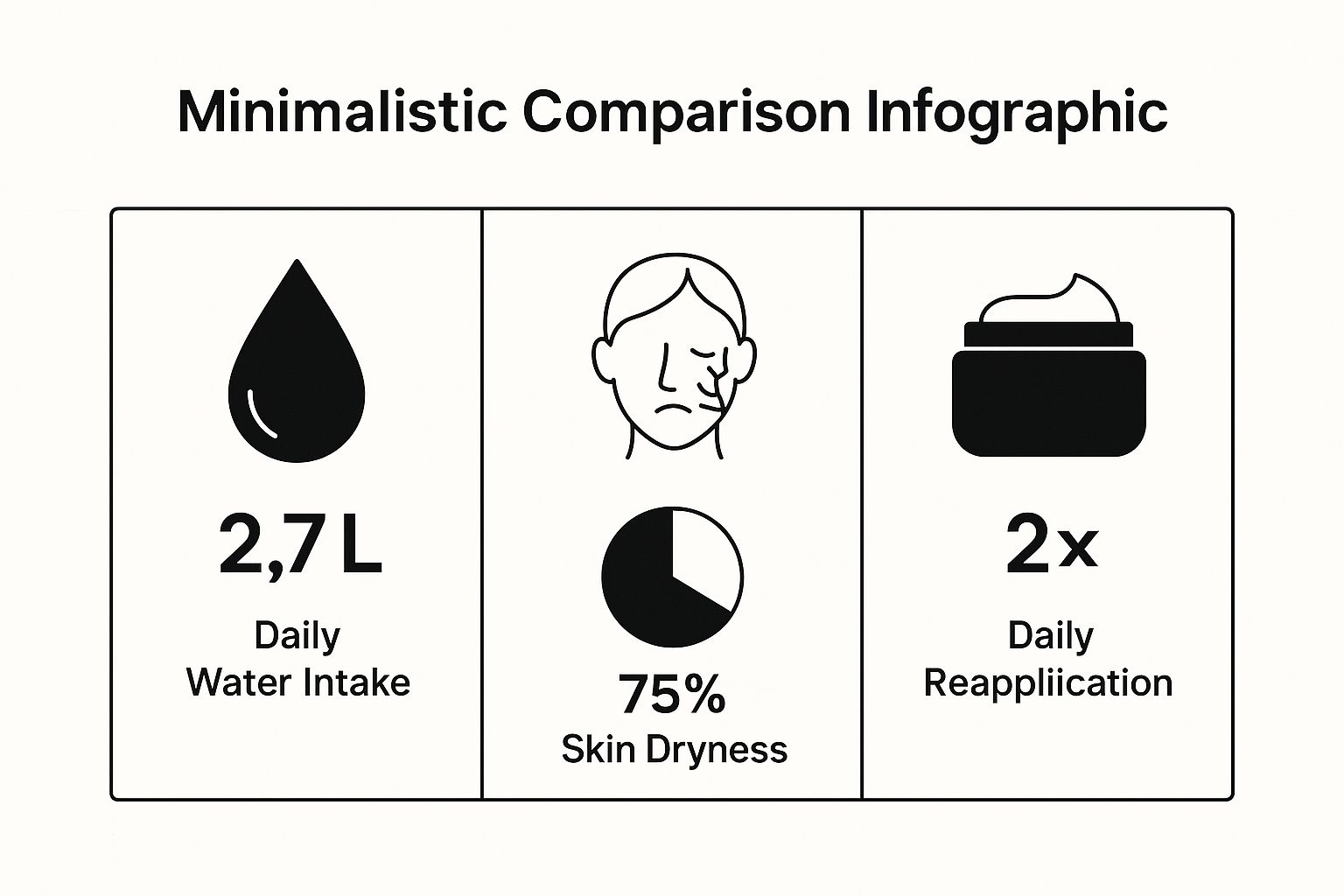
Ingredients to Put on Pause
Now, let's talk about the heavy hitters that need to take a temporary break. For your peace of mind and your baby’s safety, it’s best to avoid certain potent ingredients until after you’ve delivered and finished breastfeeding.
The main ones to steer clear of are:
Retinoids: This is the most important one. All forms, including over-the-counter retinol and prescription tretinoin (Retin-A), are a hard no.
High-Dose Salicylic Acid: Small amounts in a face wash that you immediately rinse off are usually okay, but avoid leave-on treatments, lotions, or peels with higher concentrations.
Hydroquinone: A powerful skin-lightening agent that is not recommended during pregnancy.
Pregnancy Skincare Ingredient Cheat Sheet
To make it even easier, here's a quick reference table. When you're shopping or checking your current products, this can help you make a fast, informed decision.
Ingredient Status During Pregnancy Why Retinoids (Retinol, Tretinoin) AVOID Linked to birth defects and best avoided completely. Hyaluronic Acid SAFE A natural substance in the body; excellent for hydration. Vitamin C SAFE A great antioxidant to brighten skin and protect from damage. High-Dose Salicylic Acid AVOID High concentrations can be absorbed; stick to low-dose washes. Niacinamide SAFE Wonderful for calming inflammation and supporting the skin barrier. Hydroquinone AVOID High absorption rate; safer alternatives exist. Azelaic Acid SAFE A top choice for safely managing pregnancy-related acne and melasma.
This cheat sheet isn't exhaustive, but it covers the most common ingredients you'll encounter.
Making the switch to pregnancy-safe products doesn't have to be a chore. Knowing what to look for is half the battle. If you’re ready to build your new routine, feel free to explore our curated list of pregnancy-safe products designed to nourish your skin safely through every trimester.
Addressing Common Skin Changes During Pregnancy
Even with a perfect daily routine, pregnancy can throw some unique skin challenges your way. It's completely normal. Let's talk about how to handle three of the most common issues so you can feel more comfortable and confident in your changing skin.
Navigating Hormonal Acne
Hormonal breakouts are one of the most common complaints I hear from expectant mothers. It can be incredibly frustrating, especially when your old go-to treatments are suddenly off-limits.
Instead of reaching for aggressive acne products, the key is to be gentle but consistent. A fantastic, pregnancy-safe ingredient for this is azelaic acid. It's a true superstar for calming the inflammation and redness that comes with hormonal pimples, and it does so without causing harsh side effects.
While you're managing active breakouts, it's natural to worry about what's left behind. For stubborn post-acne marks, you might want to bookmark our guide on microneedling for acne scars to explore as a safe and effective option after your pregnancy.
Managing Melasma
Melasma, often called the "mask of pregnancy," shows up as blotchy, dark patches, usually on the cheeks, forehead, and upper lip. Your absolute best defense against it is diligent sun protection. I can't stress this enough.
We’re talking about a broad-spectrum mineral sunscreen with an SPF of 30 or higher, applied generously every single morning, rain or shine. Reapplying is crucial, too. To give your skin an extra boost, try pairing your sunscreen with a gentle Vitamin C serum in the morning. This powerful antioxidant can help brighten existing discoloration and protect against further pigmentation.
We're seeing a major shift in the skincare market. There's a growing demand for products made specifically for pregnancy-related concerns like hyperpigmentation. Expectant mothers are increasingly looking for hypoallergenic and fragrance-free formulas. You can see more details about these skincare market trends on datainsightsmarket.com.
Soothing Stretching Skin and Stretch Marks
First things first: stretch marks are largely determined by genetics. But that doesn't mean you can't do anything to help your skin feel more comfortable and resilient as it expands. The goal is to keep it as hydrated and supple as possible.
Think rich, nourishing body butters and oils. Applying them daily—especially to your belly, hips, breasts, and thighs—can make a world of difference in your skin's comfort. Look for hero ingredients like these:
Shea Butter: An incredible emollient that conditions and softens the skin.
Cocoa Butter: Famous for creating a protective barrier that locks in moisture.
Vitamin E: A classic antioxidant that helps protect skin cells from damage.
This simple ritual won't just improve your skin's elasticity; it’s also a wonderful way to connect with your changing body during this special time.
Your Top Pregnancy Skincare Questions, Answered
Once you start thinking about a pregnancy skincare routine, a million questions usually follow. It's completely normal! Getting clear, expert-backed answers is the best way to feel confident about the products you're putting on your skin.
Can I Still Get Facials While Pregnant?
Yes, you absolutely can—and you probably deserve the pampering more than ever! The key is to switch to gentler, more hydrating facials. Think soothing, nourishing, and relaxing.
You'll need to put a pause on more intensive treatments for now. This includes aggressive chemical peels, microdermabrasion, and any facials that use strong electrical currents or a lot of heat. The most important step? Always, always tell your esthetician you’re expecting before they even touch your face. This lets them tailor everything just for you, using pregnancy-safe products and techniques.
If you're already dreaming about tackling skin concerns after the baby arrives, you can bookmark our guide on chemical peel before and after results for later.
Think of your esthetician as your skincare partner. When you're open with them, they can create a wonderful, worry-free experience that’s both effective and completely safe for you and your little one.
Do I Really Have to Change My Entire Routine?
Probably not! Before you toss everything in your medicine cabinet, take a moment to audit your current lineup. You might be surprised at what can stay.
The main goal is to identify and remove any no-go ingredients. Retinoids are the big one—they need to be stopped as soon as you know you're pregnant. However, your go-to gentle cleanser or your favorite simple moisturizer are often perfectly fine to keep using.
My best advice? When you do add something new, introduce just one product at a time. Pregnancy can make your skin extra sensitive, so this gives you a chance to see how it reacts before you commit.
